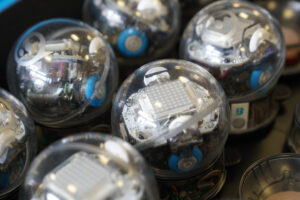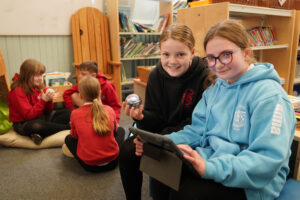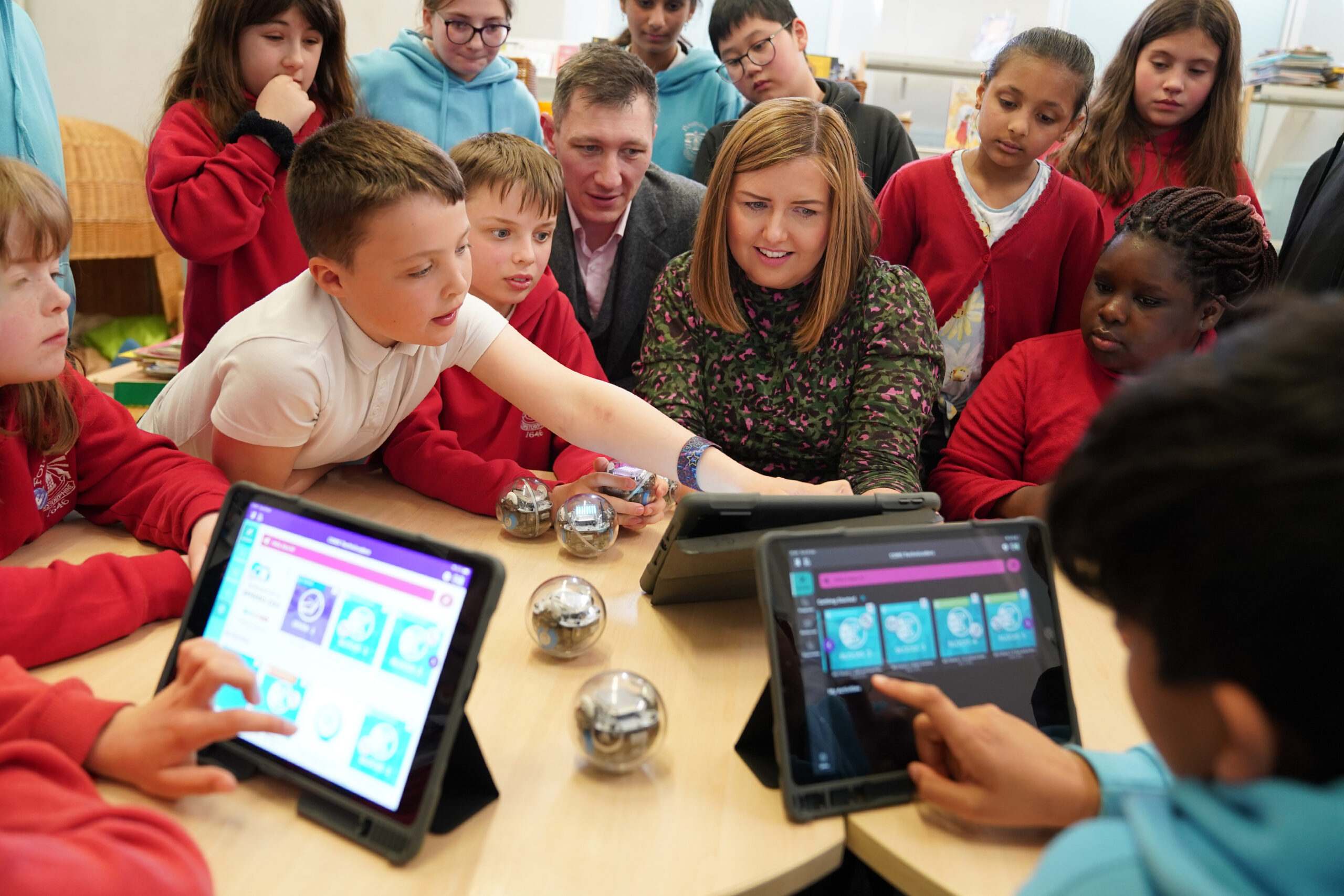Corstorphine Primary School’s coders of the future inspired by CGI and Digital Xtra Fund
The city of Edinburgh is known globally as a booming tech hub, with huge demand for job hunters looking for careers in coding, software development, and cybersecurity. As these opportunities continue to grow, it’s never been more important for those in education in the city itself to make sure its children are engaged in the world of STEM, technology and computing – in particular pupils of primary school age.
At Corstorphine Primary School, teacher Neil Stannett recognised the need to boost interest among pupils in coding and STEM in a creative way. As a result, he launched the Technicoders and Coding Club, made up of 10 boys and 10 girls from P6 and P7. The club began meeting every week to provide engaging ways to learn how to code.
Funding was gained thanks to a £3,000 grant from Digital Xtra Fund, a charity whose backers include global IT company CGI. Digital Xtra Fund’s mission is to provide all young people in Scotland with the chance to learn meaningful digital skills such as coding or robotics through extracurricular activities, especially those who otherwise would not get the opportunity to do so.
 This allowed Corstorphine Primary to buy new Sphero BOLT coding robots and equipment which made the learning environment of the club come to life. Together with iPads for pupils provided by CGI through City of Edinburgh Council’s Edinburgh Learns for Life, the club members’ love of all things coding has been transformed, with huge levels of interest and engagement.
This allowed Corstorphine Primary to buy new Sphero BOLT coding robots and equipment which made the learning environment of the club come to life. Together with iPads for pupils provided by CGI through City of Edinburgh Council’s Edinburgh Learns for Life, the club members’ love of all things coding has been transformed, with huge levels of interest and engagement.
Mr Stannett said: “I was excited at the prospect of being able to support our new pupil group to learn about coding, and experiment creatively with robotics. Thanks to the grant from Digital Xtra Fund, we were able to purchase a set of 15 Sphero BOLTs in a travel charging case, along with a variety of accessories to go with our school sets of micro:bits.
“The BOLTs were ideal for our pupil group to learn with as they can be coded using different programming languages. They are also just great fun. The club itself was formed just before we purchased the robots. We were incredibly lucky to have a number of pupils who were keen to support the school with its digital journey.”
 Mr Stannett said the support of Digital Xtra Fund has been transformative, as has Edinburgh Learns for Life’s iPads. The pupils can use the iPads not only in their everyday work, but also for coding the Sphero BOLTs. They were also given insights into future potential careers from those already working in STEM among Digital Xtra Fund’s backers. These included senior managers from CGI, a global IT firm with local roots that supports communities across Scotland.
Mr Stannett said the support of Digital Xtra Fund has been transformative, as has Edinburgh Learns for Life’s iPads. The pupils can use the iPads not only in their everyday work, but also for coding the Sphero BOLTs. They were also given insights into future potential careers from those already working in STEM among Digital Xtra Fund’s backers. These included senior managers from CGI, a global IT firm with local roots that supports communities across Scotland.
Lyndsey Teaz, Vice President, Glasgow Metro, and Andrew Fournet, Commercial Manager and Co-Chair of Environmental Task Force Space Scotland, visited to give a special talk on how their company uses space technology to provide technological solutions for clients and also saw first-hand the amazing projects that the club had been involved with.
Mr Stannett carried on: “Sharing our work with and hearing about the career paths of Lyndsay and Andrew, and the work they are involved with, opened their eyes to the almost limitless possibilities a keen interest in technology can take you.
“Also, the Edinburgh Learns for Life iPads have provided a real benefit to learning. It meant that we didn’t have to worry about booking out a set of school iPads each week and the members of the Technicoders Club could jump right in each lunchtime with their own devices.
“It also meant they could save their projects to their own account and not have to worry about finding the same iPad each week, which also increased a sense of ownership.”
 With a club split 50/50 between boys and girls, Mr Stannett noticed different ways in which they engaged with the BOLTs and iPads. He said: “The group was mixed in terms of interests, as some preferred to explore the story-telling capabilities of the robots, while others were more interested in the ‘nuts and bolts’ of how each coding programme worked.
With a club split 50/50 between boys and girls, Mr Stannett noticed different ways in which they engaged with the BOLTs and iPads. He said: “The group was mixed in terms of interests, as some preferred to explore the story-telling capabilities of the robots, while others were more interested in the ‘nuts and bolts’ of how each coding programme worked.
“Overall through, the Technicoders Club boosted interest in coding and computing not only among pupils, but staff in the school too. I often had teachers asking me how some of the programmes worked and I ran a Micro:bit training session for interested staff members.”
The pupils were also keen to pass on what they had learned to other younger years, also ‘lighting the fuse’ of interest among them.
He continued: “We decided to set up a P5 Code Club. One of the stand out moments from the group for me has to be when, during our initial sessions with the P5s, a small group started creating a spooky story using the text-speech function on the iPads and had the Sphero BOLT move across a haunted house drawn on paper on the floor.
“This instigated the next few weeks of learning, as all the groups began creating stories and using their robots to move through a setting or act as the main character. I was so impressed at the creativity and innovation on show.”
It was also heartening that, in a sector where men outnumber women in careers, the club’s girls enjoyed coding as much as the boys.
Mr Stannett concluded: “I think it is fantastic that a lot of old-fashioned stereotypes around technology are dying out and anyone can head into any career they want to.
“I have no doubt our Technicoders could step into any career path linked to technology. They all demonstrated a fantastic drive and sense of ‘what can I do to make this work?’ These positive attitudes will take them much further than just knowing a set of coding skills.”

